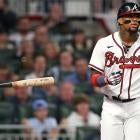These strategies apply specifically to auction leagues. For strategies on draft leagues, Rotisserie leagues and Head-to-Head leagues, check out the strategy guides for each either already posted on the site or set to appear in the coming days.
In the cold, unforgiving world of real-life economics, a certain quality defines me: I don't spend.
While some people rush out to buy the latest, greatest gadget or gizmo, I prefer to wait, sitting on my little pile of money until I find something I really, really, without the slightest doubt or hesitation, want.
Call it an instinct -- a basic means of survival. I don't like to throw around the fundamental resource of my existence unless I know the benefit justifies the cost. And I can afford to take that approach because I know even if I change my mind and decide I want what everyone else has, I can still get it -- maybe even for less money. Stores constantly restock their shelves, after all, so it won't run out or disappear. And because companies work tirelessly to invent newer, faster technology, I might even end up getting something better. So yes, holding on to money, as I've learned, is a good thing.
But not in Fantasy Baseball. Not in a league that uses an auction instead of a draft.
See, a Fantasy Baseball auction exposes us to a foreign concept -- something we, in this mountain of luxury known as the United States of America, rarely have a chance to experience: a finite supply.
Once a player goes, he's gone -- as in never coming back, no matter how much money we have available to spend on him.
But that's the thing: We all have money available to us at the beginning of an auction -- plenty of it -- and we have it for the explicit purpose of spending it on baseball players. We don't get to keep what we don't spend, so we have every incentive to get rid of it. It's like when you purchase a package of tokens at an amusement park. You want to use every last token during that short time you visit the park because those tokens have zero value except within the framework of that alternate world.
And even though we know that, even though none of us lives under the delusion that we'll receive a stack of cash equal to the amount of money we don't spend on auction day, the idea that we have to spend every last dollar we have -- fictional or otherwise -- is so fundamentally unnatural that we tend to resist it.
Everybody, no matter how frugal, wants to find a bargain, and during the three hours or so of an auction, you can easily fall into the trap of bargain hunting, of passing on player after player that you consider a little bit overpriced. But here's the problem with bargain hunting: You might never find one. And you know what? You can win without one.
You can't win, however, if you get nothing, if you spend so much time waiting for a bargain that everyone else gobbles up the studs while you end up with Hideki Matsui as your No. 1 outfielder. Oh, but you got him for only $1 because everyone else spent their money on studs. Good deal, right?
Maybe, but how good is any deal that results from you having the worst team in the league?
So to avoid the trap of having a handful of dollars and nobody left to spend them on, I have to fight my natural tendencies. I have to remind myself that running out of money isn't nearly as detrimental as running out of players and that the window of opportunity to purchase the best players will always close sooner than I expect. Then, as if turning around to swim upstream, I grit my teeth, take a deep breath, and do the one thing that goes against every natural fiber of my being:
Spend. For the love of Pete, spend. Don't spend recklessly or needlessly, forcing yourself to field a team halfway comprised of $1 players. But if you can afford a good player, make sure you get a good one before they all disappear.
Because they don't restock the shelves in Fantasy Land, and their tokens mean nothing when they go out of business.
Everybody thinks like you do
When Fantasy owners first consider having an auction instead of a draft, they tend to focus on the freedom such an approach will permit them. No longer bound by draft order, having to wait their turn and watch helplessly whenever someone else picks "their guys," they can get -- or at least try to get -- any player they want.
But that general conceit overlooks the somewhat obvious truth that the benefit of an auction is the same for everyone. Just because you recognize that you have an opportunity to purchase two players of first-round value doesn't mean your competitors won't shell out big bucks trying to do the same. Yes, an auction gives you freedom, but that freedom could end up hurting you more than it helps you. A draft has a way of evenly distributing talent as long as nobody does anything crazy, but in an auction, just as many people will end up with zero first-round players as two. Hey, if someone's getting more, someone else has to get less.
Typically, you can avoid the standard pitfalls of a Fantasy auction -- waiting too long at a position, getting into a bidding war, that sort of thing -- if you operate under the general assumption that everybody thinks like you do. You shouldn't come up with a plan too firm or love a particular player too much, because in a room with 11 other people, chances are someone has the same plan or loves that player just a little bit more. And while overpaying a little for something you really want is in some ways advisable, you can't afford to do anything ridiculous.
Let's say, for example, you decide going into an auction that you want one of the three elite shortstops: Hanley Ramirez, Jose Reyes or Jimmy Rollins.
Hey, it's an auction. You have your choice of three, and you can bid on all of them. It'll happen, right?
So the big day arrives, and the first of the three shortstops, Ramirez, goes up for auction. You get in the bidding early, but as the price climbs dollar by dollar past the amount you expected to pay for him, you think better of it, back off and decide to let him go.
"That's OK," you say. "I can still get Reyes or Rollins."
Reyes goes up for auction next. You again don't like the price.
"That's OK. I'll just get Rollins."
Stop. You've just committed. You've put yourself in a this-player-or-bust scenario and left yourself vulnerable to either an outrageous bidding war or a heartbreaking disappointment.
And unless the rest of the league falls asleep on you, you will have one or the other.
Because everyone did the exact same thing you did. Everyone crossed the first two names off his cheat sheet and pinpointed Rollins as the last of the elite shortstops. So however much you thought was too much for Ramirez and Reyes, Rollins -- a lesser player, according to most people -- will likely go for even more. Hey, it's the last chance for everybody. All your competitors will go into desperation mode just like you.
Knowing the alternative, wouldn't you much rather go back in time and shell out a few extra dollars for Ramirez or Reyes than get in a bidding war for a player you don't like nearly as much?
But that's the kind of thing that can happen when you momentarily forget you have living, breathing opponents that don't always go by the book. They have working minds that often follow the same logic as yours. That little example also establishes a much more specific guideline: Never wait to purchase the last player in a particular tier. The rest of your league will try to do the same thing. If you really want a player from that tier, invest a few extra bucks in one earlier in the auction.
Wait for it early; go for it late
Although it somewhat contradicts many of the ideas presented in this piece -- that you shouldn't wait too long to pursue the players you want, for instance -- most longtime Fantasy owners will tell you that in the early stages of the draft, when your turn comes to nominate and place an opening bid on a player, you should nominate one you don't want.
The approach makes sense up to a point. Your opponents will win those players you don't want and then have less money to spend on the players you do want, taking them out of the competition ... in theory.
But the danger comes when you start reaching the end of a tier at a particular position. If you keep nominating players you don't want -- Mark Teixeira, Lance Berkman and Prince Fielder, let's say -- and keep waiting for a player you do want, such as Justin Morneau, you might end up in another bidding war just like you had with Rollins.
Instead of using them as bait, those players you don't want can help you just by remaining available. If your opponents know they can pursue them instead, they might not bid so aggressively on Morneau. So instead of getting sneaky, maybe you should just nominate Morneau and not throw a wrench in your own plans.
Certainly by those middle stages of the auction, you don't want to run the risk of depleting the player pool so much that everyone wants the same players you do. It doesn't work. Patience doesn't pay off. And if you wait for a specific player you want and watch as player after player after player go off the board instead, when the time comes to bid on your player, you better win him because you won't have a Plan B to fall back on. Again, they don't restock the shelves in Fantasy Land.
No matter how much money you save for a player, someone will always save more.
Always. Always.
They might not even want the player half as badly as you do, but they'll recognize that he's the best use of all that money they forgot to spend and snatch him away from you like you don't even care.
I know from experience.
It was an NL-only league, last year. I wanted Nate McLouth and thought I could win him with my remaining max bid of $9. But I wanted to make sure. I kept nominating other players instead, draining everyone else's budget. During that time, I saw plenty of decent sleepers go off the board -- ones I might potentially want, but none that struck my fancy like McLouth.
Finally, with a bare-bones crop of hitters remaining, someone nominated McLouth. I thought I had him. I knew someone else had a max bid of $8, but I hadn't seen anyone with more than that in half an hour or so. I went ahead and bid the full $9.
And then, that guy -- that one guy hiding in the bushes with a remaining max bid of $10 -- decided to leap out in broad daylight and one-up me.
Despite how careful I'd been, and in some ways, how lucky I'd been, someone else still had the extra dollar needed to steal McLouth away from me.
He placed the winning bid, I cried giant tears, and McLouth became everything McLouth became.
Lesson learned.
The last leg: When the auction becomes a draft
Inevitably, the auction will reach a point where everyone -- or everyone who succeeds in using his full budget, anyway -- can place no more than $1 bids.
It's not a bad thing. A well-balanced roster should have some $1 sleepers. Of course, you'd like to avoid hitting that $1-only stage too early -- like, when you still have eight openings on your roster -- but at least if that happens, you know you didn't leave any money on the table.
The most important thing to remember when you reach that $1-only stage is that you can only win players you nominate yourself, and for obvious reasons. The minimum opening bid for a player is $1, so if someone else opens the bidding, you're immediately out of the running.
At that point, the auction essentially becomes a draft. You don't want anyone to beat you to your sleepers, so when your turn comes to place an opening bid, you have to bid on the player you want most. Even if some opponents can still outbid you for him, having not reached the $1-only stage of the auction themselves, you have to go for the player you want and just hope those wealthier opponents have players they want instead.
Of course, if some of your opponents can still outbid you at that point, you have to make sure you bid on a player you can reasonably obtain for $1 and not one so overwhelmingly good that those wealthier opponents have obviously reserved their cash specifically for him. If, for example, Vernon Wells lasts until those latter stages of the auction, you shouldn't go bidding $1 on him. You know one of those wealthier opponents will just outbid you, forcing you to wait 12 picks until you can place your next bid -- 12 picks your opponents can use to steal your sleepers away from you.
In some ways, you could call that $1-only stage the most stressful part of the auction. Of course, in some ways, you could call the whole auction stressful, making it not worth your trouble when you could have a nice, easy, straightforward draft.
Then again, that added level of intensity is what distinguishes an auction from a draft, making it worth playing in the first place.
You can e-mail us your Fantasy Baseball questions to DMFantasyBaseball@cbs.com . Be sure to put Auction Strategies in the subject field. Please include your full name, hometown and state.





















